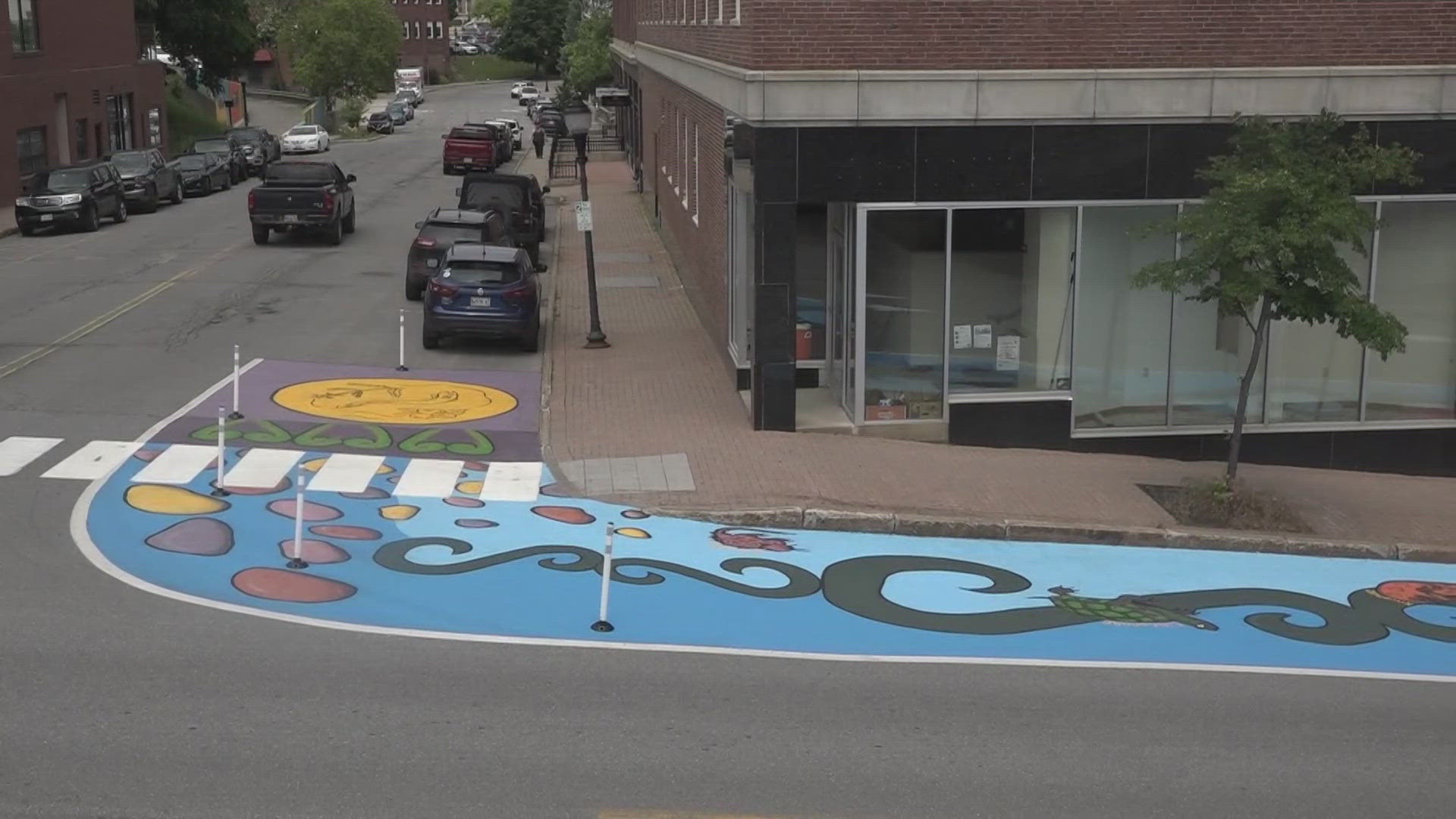BANGOR, Maine — While many people in downtown Bangor are admiring a new mural that highlights Wabanaki culture, people from the Wabanaki Alliance and of Wabanaki Nations are working behind the scenes to stress the importance of respecting those represented by the artwork and urging others to use proper language when referencing Wabanaki people.
The new mural on Hammond Street depicts Katahdin, waters that are sacred to Wabanaki Nations like the Kenduskeag Stream and Penobscot River, animals and native sources of food such as fiddleheads — ultimately shedding light on the appreciation of land, earth, and nature.
"You can see in the mural we have stories of our animals, we have stories of our foods," Andrea Sockabasin, senior director for the center for public health at Wabanaki Public Health and Wellness said. "I think it's a way to show representation of the tribes in Maine."
Sockabasin is Passamaquoddy and Penobscot Nation, and she said she takes pride in her heritage.
The ground mural was completed on Wednesday and shines a light on Wabanaki culture, one that Bangor Beautiful co-founder Greg Edwards said has historically been suppressed.
"Certainly, Wabanaki culture has not been respected and has been written over," Edwards said.
Edwards said he hopes this mural will receive appreciation, admiration, and respect—a respect that Houlton Band of Maliseets tribal ambassador Osikiyol Crofton-Macdonald said people of Wabanaki Nations also deserve.
The Wabanaki Alliance issued a media style guide to more than 250 organizations, news, and media outlets that it interacts with on Wednesday, the same day the mural was completed.
The media style guide educates organizations about how to respectfully refer to, interact with, and reference various Wabanaki tribes and people of Wabanaki Nations in media.
"Some of the things that don't get respected or acknowledged that are Wabanaki are our impacts to democracy, governance, and our laws and our treaty history," Crofton-Macdonald said.
Crofton-Macdonald noted that the interrelationship between Wabanaki Nations and the state of Maine has been tumultuous despite there being some improvement over the years. He explained Wabanaki Nations as a whole are often referenced as a historical past-time, which is disrespectful to their existence.
"There's been a myth, and this has been perpetuated through our school systems and the way that we talk about history is that native people are an aspect of history and that we are something that you read about in a book, when we are still here," Crofton-Macdonald said. "Our families, our network connections, and our communities are still strong. We're still here. And if you want to get to know native people, you can come ask. And that's the first step, to talk directly to native people."
The overwriting of the history of Wabanaki communities in Maine and across the country has resulted in the misrepresentation and misunderstanding of people from Wabanaki Nations.
Penobscot Nation ambassador and member of the board of directors for Wabanaki Alliance Maulian Bryant said it is hurtful to constantly see people of Penobscot Nation, Passamaquoddy, Mi'kmaq, and Houlton Band of Maliseets misrepresented in media and in society as a whole.
Bryant said respecting people of Wabanaki Nations starts with something as easy abandoning offensive language like "Maine's tribes," explaining that Wabanaki Nations should always be referenced by their individual names.
'"Our Wabanaki Nations predate statehood of Maine. So, it doesn't make sense that we would be 'Maine's tribes,' and also, we don't want to feel like we're owned by the State of Maine. And that sort of concept of ownership is implied when you hear 'Maine's tribes,'" Bryant said. "When we hear that, it feels like you're continuing that paternalistic relationship that the state has tried to exert over the tribes in a number of different ways through policy and different legal things."
Bryant said Penobscot Nation, Passamaquoddy, Houlton Band of Maliseets, and Mi'kmaq tribes are always striving to eliminate harmful language that disrespects their culture.
She said it's also important not to group Wabanaki Nations, explaining that each nation is unique.
"I have found that moving the needle on any issue, it really helps when you understand the humanity of others," she said.
Bryant, Crofton-Macdonald, and others are constantly working to reconstruct societal frameworks that are harmful to Wabanaki people.
Crofton-Macdonald said he has heard nothing but great things about the new mural in downtown Bangor that highlights Wabanaki culture, emphasizing that he wants to get to Bangor to see it for himself.
While Crofton-Macdonald appreciates people's love for art that represents Wabanaki Nations, he said he further challenges people to look deeper than the mural on the street.
Click here to learn more about how to respectfully reference the people of Wabanaki Nations.

